|
|
|
Sort Order |
|
|
|
Items / Page
|
|
|
|
|
|
|
| Srl | Item |
| 1 |
ID:
110475
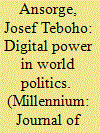

|
|
|
|
|
| Publication |
2011.
|
| Summary/Abstract |
The nature of political power has changed with the advent of modern information technology while our theories and metaphors to understand it remain wedded to earlier periods. This article begins with a discussion of some of the work done by databases in domestic and world politics. In particular, it introduces the political effects of contemporary data-management practices through short examples of terrorist information databases, the 2008 Obama campaign's database, as well as biometric databases deployed in Iraq, Afghanistan and Liberia. This leads to a consideration of the finite applicability and relevance of the widespread metaphor of the Panopticon to these kinds of cases. Given the limitations of such an image, the concept of digital power and the political metaphor of Cuntz's Tower are proposed. Digital power foregrounds the importance of machines for contemporary sovereignty while moving beyond ocular-centric notions of surveillance. Cuntz's Tower illustrates the power of identification and sorting in addition to the Panopticon's emphasis on self-discipline. This article acts as an initial ground-clearing exercise for more extensive analyses of databases in domestic and world politics.
|
|
|
|
|
|
|
|
|
|
|
|
|
|
|
|
| 2 |
ID:
110474
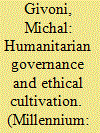

|
|
|
|
|
| Publication |
2011.
|
| Summary/Abstract |
This article seeks to analyse contemporary humanitarianism as an advanced-liberal formation of global governance. It tracks the emergence in the 1970s of the French humanitarian organisation Médecins sans Frontières and shows that its care for and control of distant victims has been commingled with and dependent upon care for Western selves. The article contends that humanitarianism 'without borders' was the outgrowth of the legitimacy crisis of the medical profession, and that its practice of witnessing has ultimately been a mode of ethical self-cultivation by means of which physicians could fashion themselves as more enlightened personae. It further shows that the recent concern with the detrimental side effects of humanitarian action should be deciphered as the culmination of the practices of the self in which global humanitarianism has been embedded since the 1970s.
|
|
|
|
|
|
|
|
|
|
|
|
|
|
|
|
| 3 |
ID:
110479


|
|
|
|
|
| Publication |
2011.
|
| Summary/Abstract |
The crisis of 2009 has not proved to be a great impetus for new critical redirection of political and economic thinking in the West: both politico-economic structures in the West and the models of development and democratisation at the heart of Western foreign policy agendas remain much the same. This is despite the continued efforts of critical and philosophical IR theorists to push 'critical thinking' and 'alternative agendas' in world politics. Why the dismal 'real-world' failure of critical and philosophical IR research? This piece reflects on the trends towards depoliticisation, fragmentation and de-concretisation of critical and philosophical IR research and suggests some potential ways forward in reorienting critical and philosophical research in the field.
|
|
|
|
|
|
|
|
|
|
|
|
|
|
|
|
| 4 |
ID:
110481
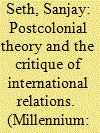

|
|
|
|
|
| Publication |
2011.
|
| Summary/Abstract |
This article in three parts offers the beginnings of a postcolonial critique of mainstream International Relations (IR). The first part argues that IR, where it has been interested in history at all, has misdescribed the origins and character of the contemporary international order, and that an accurate understanding of the 'expansion of the international system' requires attention to its colonial origins. The second part suggests that IR is deeply Eurocentric, not only in its historical account of the emergence of the modern international order, but also in its account(s) of the nature and functioning of this order. The human sciences are heirs to a tradition of knowledge which defines knowledge as a relation between a cognising, representing subject and an object, such that knowledge is always 'of' something out there, which exists independently of its apprehension. The third part of the article suggests that knowledges serve to constitute that which they purport to merely cognise or represent, and that IR theory serves to naturalise that which is historically produced.
|
|
|
|
|
|
|
|
|
|
|
|
|
|
|
|
| 5 |
ID:
110473


|
|
|
|
|
| Publication |
2011.
|
| Summary/Abstract |
The pluralist-solidarist debate in English School theory - which concentrates on discerning the kind of international society in which we live - encourages overgeneralisations that either overstate international society's presumed solidarity or vigorously defend instrumental commitments that underplay actual ethical advances. Building upon insights by Bellamy, Buzan and Hurrell, I attempt to extricate the debate from its current impasse by recasting pluralism and solidarism as ideal-typical assessments of agreements within particular issue areas. The argument is illustrated with reference to human security. Two reasons are behind this choice. Firstly, it allows me to pose more pluralist-friendly claims on a terrain that is presumably ceded to solidarists. Secondly, the contested nature of human security allows me to highlight the fluidity of the concepts, which reveals not necessarily solidarism's cooperative potential or pluralism's minimalist pledges, but rather fissures, uncertainties and dissonances that in the end are resolved by continual mediations between the two.
|
|
|
|
|
|
|
|
|
|
|
|
|
|
|
|
| 6 |
ID:
110477
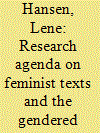

|
|
|
|
|
| Publication |
2011.
|
| Summary/Abstract |
This article starts from two interventions made at the 2008 Millennium Roundtable Discussion on Gender and International Relations: Vivienne Jabri's suggestion that feminist IR might benefit from a closer engagement with the constitution of 'the international' and 'the political' in feminist texts and Christine Sylvester's call for incorporating 'difficult feminisms' that challenge dominant understandings of which political and analytical perspective should be adopted. In response, this article lays out a more concrete research agenda focused on feminist texts that takes an empirically open view of what 'feminism' is and which incorporates factual genres and disciplines beyond political science and philosophy. To provide an example of a reading of 'the international' and 'the political' in a (difficult) feminist text, I turn to Rebecca West's Black Lamb and Grey Falcon, a non-fiction genre-hybrid tome of almost 1200 pages published in 1941. Known to an IR audience mainly through its alleged impact on the Bosnian War, I draw upon works in literary theory and women's studies to bring out West's gendered vision of international politics, giving particular attention to her constitution of the relationship between national, international and women's security. The analysis is divided into four parts which examine the gendering and embodying of empires, the politics of art and aesthetics, sacrifice and submission, and the feminist politics of writing.
|
|
|
|
|
|
|
|
|
|
|
|
|
|
|
|
| 7 |
ID:
110472
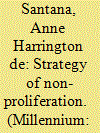

|
|
|
|
|
| Publication |
2011.
|
| Summary/Abstract |
This article criticises the leadership of the new nuclear disarmament movement in the United States for not going far enough. Whether the US administration actually wants to achieve disarmament or not, implementing the current US nuclear policy agenda will not produce a world free of nuclear weapons. Rather, it will reinvigorate an ailing non-proliferation regime by adapting it to confront new nuclear threats. This conclusion is based on a two-part argument. Firstly, nonproliferation is a strategy much like the Cold War-era strategy of extended deterrence. Just as extended deterrence required the US to maintain the credibility of an incredible threat to attack, non-proliferation requires the US to maintain the credibility of an incredible pledge to disarm. Thus, re-establishing disarmament as a credible long-term goal of US nuclear policy will persuade other states in the short term to forgo nuclear weapons and cooperate in restricting access to fissile materials. Secondly, contrary to the common-sense interpretation of the relationship between non-proliferation and disarmament, it does not follow that a robust non-proliferation regime will lead to the elimination of nuclear weapons. In fact, experience suggests just the opposite: Non-proliferation does not lead to disarmament. In conclusion, whatever the Obama administration's aim, the current US nuclear policy will reduce the threat nuclear weapons pose to the US, while obviating the need for the US to disarm itself.
|
|
|
|
|
|
|
|
|
|
|
|
|
|
|
|
| 8 |
ID:
110480
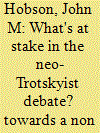

|
|
|
|
|
| Publication |
2011.
|
| Summary/Abstract |
This article seeks to appraise the direction that historical sociology has undertaken within Millennium in the last four decades while simultaneously laying out the groundwork for a 'thirdwave' historical sociology of international relations. In particular, I intervene in the current neo-Trotskyist debate concerning whether the concept of uneven and combined development (U&CD) should be historically generalised or merely confined to the modern capitalist-industrial era that emerged as late as the 19th century. My aim is to support the former position. I argue that failure to historically generalise the concept - at least to a certain extent - leads ultimately into a Eurocentric cul-de-sac. To advance my third-wave non-Eurocentric historical sociological approach, I apply U&CD to the rise of the West in general and to British industrialisation in particular. By extending U&CD back to at least 800 CE, I argue that the West was a late developer that enjoyed the advantages of backwardness. That is, only by borrowing from, and assimilating the technologies, ideas and institutions of, the key early developers - China, India and the Islamic Middle East/North Africa - could Europe rise up from its tiny promontory on the far western edge of the vast Afro-Asian economy to eventually overtake its Eastern predecessors some time during the 19th century.
|
|
|
|
|
|
|
|
|
|
|
|
|
|
|
|
| 9 |
ID:
110476


|
|
|
|
|
| Publication |
2011.
|
| Summary/Abstract |
Only three weeks after the events of 11 September 2001 (hereafter 9/11), Aaron Sorkin's The West Wing delivered a special one-off episode, outside of usual storylines. The episode, titled 'Isaac and Ishmael', is interesting because it adopts an explicitly pedagogical theme to teach viewers how to think about the events of 9/11. The episode can thus be read as an instance in the wider construction of the meaning of those events. In this respect, this article argues that the production of the episode contributed to notions of rupture and exceptionalism. In addition, despite the potentially 'liberal' and 'academic' lessons given by the show's stars, the extensive contextualisation of the previously incomprehensible events for a dominantly American audience actually relayed, amplified and reinforced the emerging dominant discourses of the Bush Administration. Accepting and repeating official tropes, The West Wing ultimately served to further limit space for debate in the wake of 9/11.
|
|
|
|
|
|
|
|
|
|
|
|
|
|
|
|
|
|
|
|
|